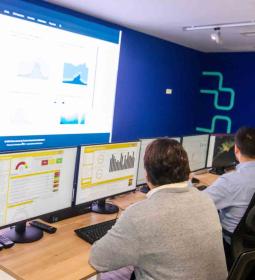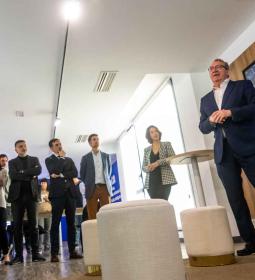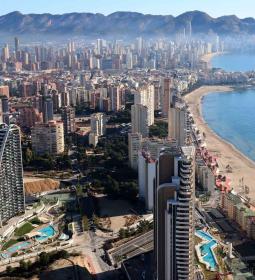The initiative is in the development phase and will be fully implemented in September 2024
Benidorm tests an innovative pilot project of non-invasive telecare for vulnerable people based on artificial intelligence

The city of Benidorm is going to test an innovative non-invasive telecare pilot project for the care of the elderly and vulnerable people based on artificial intelligence, promoted by the City Council, which is already in the development phase and will be fully implemented in 2024. mayor, Toni Pérez, presented this project today together with the councilors for Innovation and Social Well-being, Aida García Mayor and Ángela Llorca; Vicente Mayor, chief engineer of the City Council; and Vicente Porcar on behalf of Global Energy & Trading (GET), the company in charge of developing this solution.
It is a worldwide pilot project in which, in addition to the City Council and GET, the Valencian Innovation Agency (AVI), and the Valencian Institute for Research in Artificial Intelligence of the Polytechnic University of Valencia and Hidraqua participate. Specifically, the project, valued at 135,000 euros, is co-financed by the City Council and the AVI and will be tested with a group of people attached to the conventional municipal telecare service, which currently serves around 60 people.
Toni Pérez stressed that with this unique project, "we put technology at the service of people", creating a tool that "will improve the quality of life of users, prevention and assistance" provided to them.
The mayor explained that "it is the first time that we are going to combine water and electricity consumption data to create consumer profiles for advanced tailor-made guardianship services for elderly and dependent, vulnerable and at risk of exclusion people."
Thus, the system will launch an alarm in the event of a failure, alteration, or interruption in a supply (water or electricity), in a medical device, or any other type of monitored device, such as a respirator or dialysis equipment. It will react even to unforeseen changes in habits, to unusual consumption of light and water -whether due to excess, due to absence, or due to occurring at a time of day that does not match the person's habits-, medical emergencies and even taking medication, as detailed by Porcar.
These alarms will reach the municipal Social Services and/or family members of the people attached to the project, acting accordingly in the face of each eventuality or need.
As the person in charge of GET has delved into, in addition to revealing emergencies, the tool that emerged from the project can also enable "early detection of neuronal diseases", and is easily "scalable to the rest of the population of Benidorm" and "replicable in any municipality of Spain and the world”. In fact, "the will is to export this technology that is born in Benidorm nationally and internationally."
The mayor stressed that this "non-invasive telecare" project is "a reality of the well-known Internet of People (IoP)" and that it focuses "on the collection, processing, and application of personal data with the digitization of relationships between people”, to “increase the quality of life of our elderly and vulnerable people and improve their care”.
“We speak, therefore, of social sustainability; to give social use to digitization to serve the most vulnerable people by developing a system and application", he stressed after remarking that "we will only be the best destination to come if we are the best city to live in", he pointed out.
project milestones
The City Council and the rest of the agents involved began working on the project in the first months of 2022, starting the action and coordination plan in September. At this time the project is "in the data storage phase", all of them "anonymized", through the supplying companies, to establish the standards of behavior for the whole of the city.
The forecast is to present the first implementation report in May and proceed to capture data from participating households.
At this point, both the mayor and the person in charge of GET stressed that "the participation of users in the program is completely voluntary." For this, informative meetings have already been held with the users of the telecare service and the first authorizations and adhesions to the project have begun to be obtained.
Once the participants are established, the phase of gathering information from each user will begin to establish their behavior and consumption parameters, and from there establish the alarms that should arise in the event of any alteration in that behavior. Some alarms will have an individualized character. Among the information that will be used to trace these parameters are the clinical history, health, social and family circumstances, and daily habits.
By the end of this year, the aim is to implement the first version of the technological solution designed for this non-invasive telecare, to apply the necessary corrections in the following months, and for the tool to be fully operational in September 2024.




